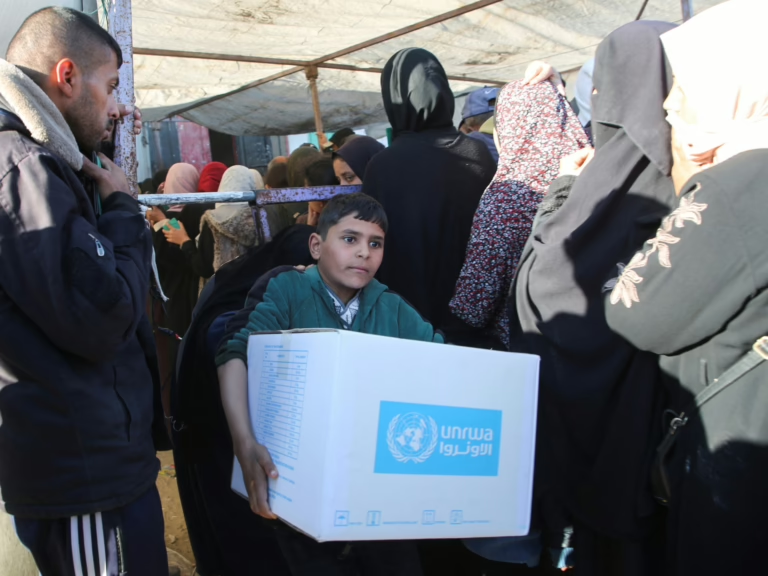Established in December 1949, nearly two years after the United Nations approved the partition of Palestine, the United Nations Relief and Works Agency for Palestine Refugees in the Near East (UNRWA) remains the sole UN body dedicated exclusively to supporting the Palestinian refugee population.
Over the years, UNRWA has played a vital role in nearly every facet of Palestinian daily life, from distributing food and providing healthcare to managing education and essential utilities. However, during the ongoing atrocities in Gaza, the agency’s operations have been severely curtailed due to Israeli restrictions and political pressures.
As prospects for a ceasefire emerge, it is crucial that UNRWA’s full range of services be reinstated to alleviate the widespread famine. The agency is uniquely equipped to deliver aid impartially and efficiently across Gaza’s population.
UNRWA has been deeply intertwined with my family’s experience. My parents, siblings, and I all attended UNRWA schools, benefiting from free education delivered by committed educators. During times of financial hardship, we depended heavily on the agency’s food aid programs. Additionally, UNRWA clinics provided us with accessible primary healthcare, vaccinations, and basic medical treatments-services especially critical for families unable to afford private healthcare.
Following the outbreak of the Israeli military assault on Gaza on October 7, 2023, UNRWA endeavored to maintain its services despite immense challenges. Nevertheless, Israel, supported by Western allies, launched a concerted campaign against the agency. In January 2024, Israeli authorities accused certain UNRWA staff of complicity in the attacks, leading to investigations of 19 employees and the dismissal of some.
These accusations prompted key Western donors, including the United States and members of the European Union, to halt their financial support. This funding freeze gravely undermined UNRWA’s capacity at a time when nearly two million Gazans relied almost entirely on its aid.
Following the ceasefire announcement in January, conditions for aid delivery improved. UNRWA reinstated a structured distribution system, establishing clear schedules and designated centers in each neighborhood. Families were required to register in advance using their identification numbers, receiving notifications specifying the exact time and place to collect their food parcels. Upon arrival, staff and volunteers verified identities to ensure equitable distribution, with parcels allocated according to family size. This organized approach provided a semblance of stability amid dire circumstances.
Regrettably, this progress was short-lived. On March 2, Israel blocked all aid shipments into Gaza, and by March 19, it resumed its military offensive. The population once again faced mass displacement and intolerable living conditions they had hoped to avoid.
By April 25, UNRWA declared its food reserves depleted, plunging Gaza into a severe famine. Many humanitarian organizations, including UNRWA, were forced to suspend aid operations, leaving over a million people vulnerable to hunger and malnutrition.
In response to Israeli allegations that Hamas was diverting aid, the Gaza Humanitarian Foundation (GHF) was established a month later to oversee aid distribution. Unlike UNRWA’s systematic approach, GHF’s operations have been disorganized and unsafe. Aid centers are situated in hazardous locations, and distribution lacks scheduling or registration. Food parcels are dumped in fenced areas, prompting chaotic rushes as people scramble to collect supplies. Israeli soldiers and foreign mercenaries enforce “order” through live fire, resulting in the deaths of more than 2,500 Palestinians seeking aid.
Beyond the deadly conditions at GHF, Israel has permitted only minimal aid into Gaza, much of which is confiscated before reaching those in need. In late July, commercial trucks were allowed entry, but their goods are diverted to merchants who sell them at exorbitant prices, further exacerbating food insecurity.
The famine’s grip remains unrelenting.
Daily, children in my neighborhood rush to small community kitchens-known as takyahs-operated by local Palestinian charities. These organizations purchase scarce food from local markets using international donations. The meals are modest-typically rice, lentils, pasta, or soup-but for families unable to afford market prices, these simple dishes are a lifeline.
Ironically, in August, many of the same nations that previously suspended funding to UNRWA issued urgent calls to end the famine in Gaza.
“Starvation is unfolding before our eyes. Immediate measures are essential to halt and reverse this crisis,” declared a joint statement from the foreign ministers of 19 EU countries, alongside Norway, Switzerland, the United Kingdom, Australia, Canada, and Japan.
Yet, by cutting support to UNRWA and enabling Israel to undermine the agency, these countries have effectively denied over two million Palestinians their fundamental right to food.
If these governments are genuinely committed to ending the ongoing genocide and hunger, they must reinstate funding to UNRWA and pressure Israel to permit the agency to fully resume its vital services.
UNRWA has long been a beacon of hope and stability for Gaza’s residents amid turmoil. To survive this crisis and rebuild afterward, the agency must be adequately funded and safeguarded. Allowing Israel to dismantle UNRWA would be tantamount to permitting the erasure of the Palestinian people.






















